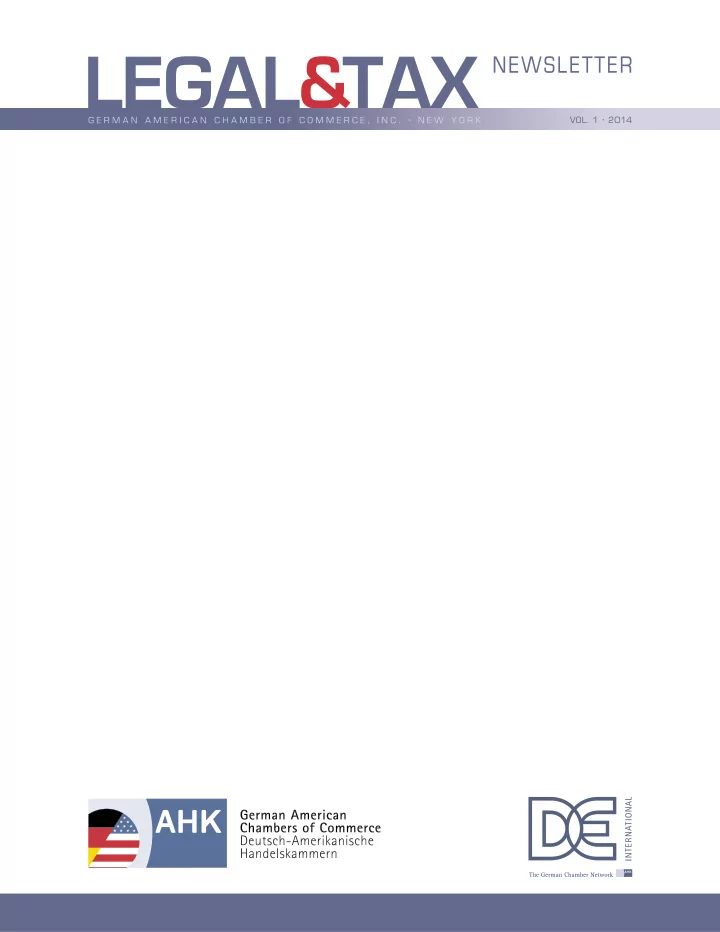

VOL. 1 • 2014
VOL. 1 • 2014 Service Abroad By Email – Has The Time Come? Serving a United States federal court complaint on a foreign corporation has never been easy. Service of process must comport with the U.S. Constitution’s requirements of due process, which means that service must be reasonably calculated, under all the circumstances, to inform parties of the action and afford them a chance to be heard and object. Federal Rule of Civil Procedure 4(h)(2) authorizes, with limited exception, service of process on a foreign entity in the same manner prescribed for foreign individuals under Rule 4(f). Rule 4(f) provides several methods of service. The first (and commonly used) is Jeffrey L. Nagel service “by any internationally agreed means ( ... ) such as those authorized by the Hague Director Convention.” Fed. R. Civ. P. 4(f)(1). But service via the Hague Convention can be a long process. In some cases the country itself will object, even if they are a signatory, creating Gibbons P.C. One Pennsylvania Plaza, long delays and potentially blocking the initiation of a lawsuit even where, under U.S. law, 37th Floor jurisdiction over the corporation is clear. New York, NY 10119 D +1 (212) 613 2061 There is another faster, less expensive method of service that may become more F +1 (212) 554 9661 routine: email. Several courts in the last year have noted that email can, under certain jnagel@gibbonslaw.com www.gibbonslaw.com circumstances, be used for service. Pursuant to Fed. R. Civ. P. 4(f)(3), a federal court has discretion to allow service by “other means not prohibited by international agreement.” Several courts have ruled that email service is not “prohibited” by the Hague Convention or other international agreement. This is true even where some countries, such as Germany, have objected and opted out of certain types of service – such as by mail or through diplomatic channels – under the Hague Convention. A recent case involving a patent claim illustrates the point. In that proceeding, Lexmark International, Inc v. INK Technologies Printer Supplies, LLC, 291 F.R.D. 172 (S.D. Ohio 2013), the plaintiff wanted to serve entities in China and Germany. The foreign defendants had not appeared, and no counsel had noticed an appearance on their behalf. Rather than trying to serve through the Hague Convention, plaintiff relied on Fed. R. Civ. P. 4(f)(3) and asked permission to serve the defendants via email. The Court allowed email service to proceed on the German and China corporations. The plaintiff demonstrated that the businesses maintained active websites and provided email addresses; and the plaintiff had used those email addresses to communicate with company representatives. There was no need, said the Court, to use Rule 4(f)(3) only as a “last resort” if Hague Convention service failed. Indeed, following established Hague Convention procedures was likely to cause delay. The Lexmark case reinforces a growing trend among federal courts. In New York, for example, courts also appear open to the idea of service on foreign entities pursuant to Rule 4(f)(3). In one recent case, a court allowed service on a China corporation’s U.S. 9
VOL. 1 • 2014 Jeffrey L. Nagel Service Abroad By Email – Has The Time Come? Director Gibbons P.C. counsel even though China objected. In that case, plaintiff suggested service on the One Pennsylvania Plaza, company by email, but the court found that unnecessary because the corporation’s U.S. 37th Floor counsel had already appeared in the case, and the court therefore found that serving New York, NY 10119 D +1 (212) 613 2061 counsel would ensure proper notice. Jian Zhang v. Baidu.com Inc., 85 Fed. R. Serv. 3d F +1 (212) 554 9661 1140 (S.D.N.Y. 2013). jnagel@gibbonslaw.com www.gibbonslaw.com There are some obvious potential problems with allowing service by email, as well as likely objections. Defendants may claim they never received the service, or that the wrong person opened and discarded the e-mail. There are also likely to be governmental objections to such a process, along with pressure by foreign corporations to disallow the practice, should it become commonplace. Counsel wishing to serve a complaint via email would be wise to use software to track delivery and under the rules need to seek court permission. Nevertheless, the pervasiveness of email as a form of communication in business today likely will make service pursuant to email extremely appealing to courts and plaintiffs. The speed of delivery and low cost are obvious advantages. Moreover, as courts and commentators have noted, several countries already allow email service in court proceedings, and it may be difficult for those countries to object when U.S. courts begin allowing such service. In short, given recent court rulings, it is likely to become more common for plaintiffs to seek permission from courts to serve a foreign entity via email. 10
Recommend
More recommend